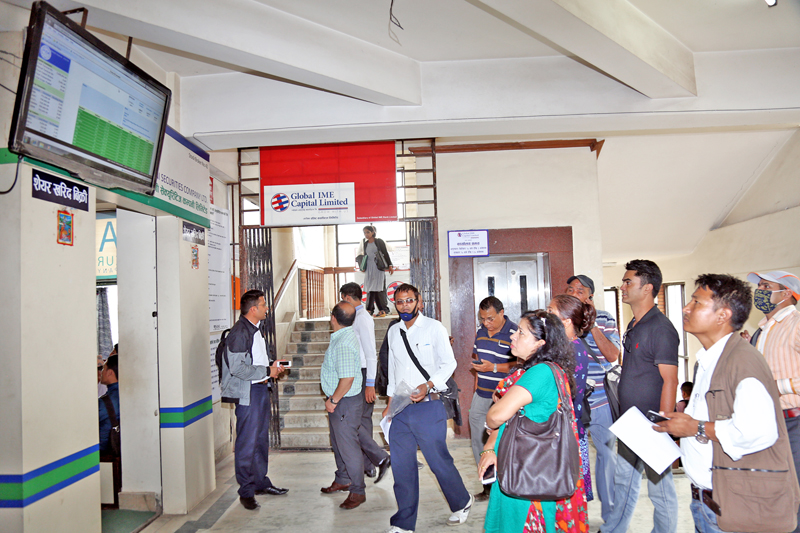Protesting stock investors call brokerage firms to halt share trading
- Investors have announced their protest programmes against the government’s move to enforce capital gains tax whether they earn profit or not from selling their shares
Kathmandu, June 4
Stock investors agitating against the circular of the Inland Revenue Department to impose capital gains tax of 7.5 per cent on the difference of market price and base price (face value) of bonus and rights shares have called on brokerage firms to halt share trading from tomorrow.
Following talks with Joint Secretary Uttar Kumar Khatri, who looks after Economic Policy Analysis Division at the Ministry of Finance, investors have announced their protest programmes against the move of the government in enforcing CGT.
Investors said the talks today ended inconclusively.
“The MoF official just listened to our grievances without providing any assurance related to changes in CGT calculation,” said Ambika Prasad Poudel, chairperson of Nepal Investors Forum.
Issuing a circular yesterday, the IRD had directed Nepal Stock Exchange and CDS Clearing Ltd to calculate the CGT on the difference of face value of stock and the market price during trading of rights and bonus shares. Earlier, the government used to enforce five per cent CGT in trade of bonus and rights share in the secondary market.
However, the method of calculating CGT was different. The CGT used to be enforced on the income made from the difference in actual price of share traded and adjusted base price of stocks.
Adjusted base price of the stock means the price of stock immediately before book closure plus the value of share received from rights and bonus divided by the number of shares. For example, if the stock price of company ‘A’ was Rs 500 before the book closure and the company issued 1:2 rights share, then Rs 500 (one unit) plus Rs 200 (face value of two units of rights share) used to be divided by three (as the investor had one unit share earlier and s/he got two more from rights share allocation). If the share price of the company has now plunged to Rs 250, earlier the shareholder would not have to pay any CGT.
However, since IRD changed the calculation method from Sunday and enforced tax in the difference of actual traded price of stock and face value of that stock, the trader would now have to pay CGT of 7.5 per cent of Rs 300. Investors have said that as the stock prices have been falling along with increased supply, they have been incurring losses in recent months. With the new rule on CGT, they argue their losses will balloon.
“Earlier, traders had to pay tax only on the profit earned from trading of bonus and rights shares. But the new provision compels share traders to file CGT whether they earn a profit or not from selling their shares,” Poudel told THT.
However, Priya Raj Regmi, chairperson of Stock Brokers’ Association of Nepal, said they had not received any official letter from investors to halt trading and a decision would be taken tomorrow after holding a discussion with investors.
The benchmark index has plunged by nearly five per cent since Finance Minister Yubaraj Khatiwada presented the federal budget in the Parliament on May 29, or five trading days ago.
The local bourse closed at 1,268.84 points today, after dipping 0.4 per cent during the course of the day.






